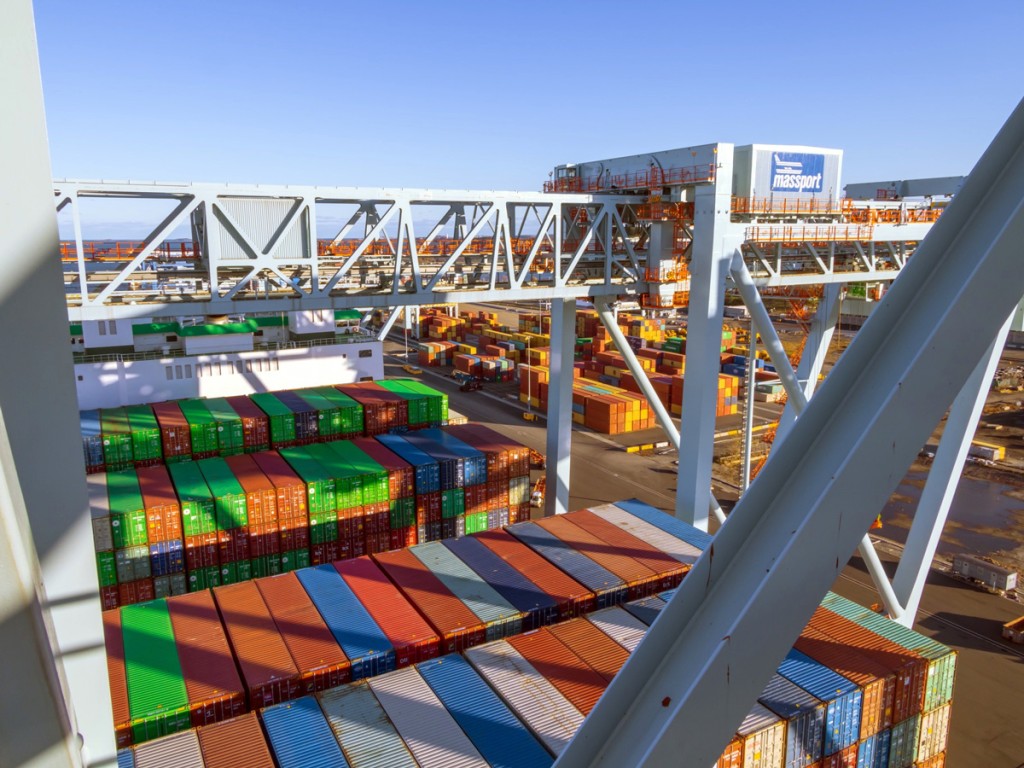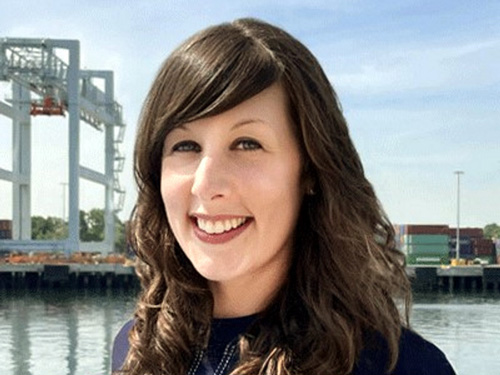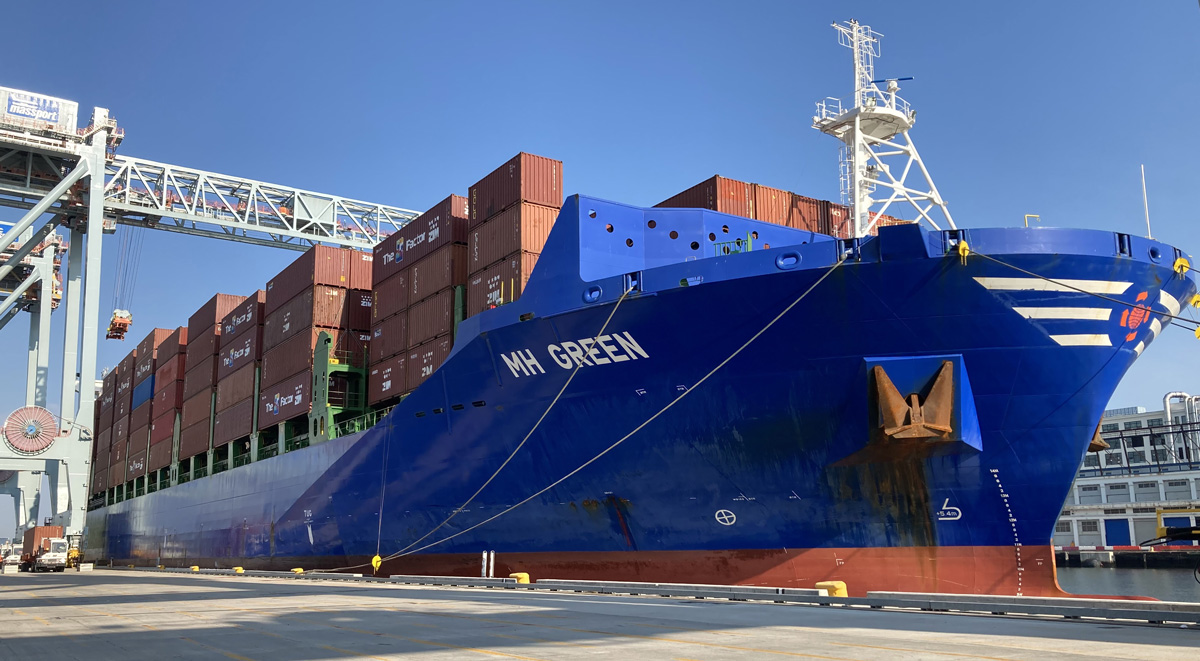Port of Boston augments global services, enhances container terminal infrastructure
Boasting expanded global ocean carrier service offerings and enhanced terminal infrastructure, the Port of Boston is furnishing new routes and new opportunities to adeptly meet supply chain demands of the thousands of businesses that count on New England’s only full-service containerized cargo gateway.
“It is a really exciting time to do business with the Port of Boston,” Lauren Gleason, deputy port director of business development for the Massachusetts Port Authority, told AJOT.
More than $850 million in investments have delivered three neo-Panamax ship-to-shore cranes plus a new 50-foot-alongside-depth Berth 10 at the port’s Conley Container Terminal, which is now called by four services offering direct connections with 15 ports of Europe, Asia and Latin America, including two new services to Vietnam and India. Vietnam is the third-largest containerized cargo trading partner of the six New England states, behind China and India.
The investments also include a navigational improvement project is in its final stage, bringing a 47-foot-deep harbor and a 1,725-foot-diameter turning basin designed to accommodate megavessels each with capacity of as many as 14,000 twenty-foot-equivalent container units, or TEUs.

Reliable value proposition
“With our expanded Conley Terminal and even more worldwide container service links, the Port of Boston is providing an efficient and reliable value proposition, saving importers and exporters both time and money with dependable relief from global supply chain challenges,” Gleason said.
Gleason served as New England sales manager for ocean carrier Hanjin Shipping and senior manager of the international supply chain of Boston-based furniture and home goods e-commerce leader Wayfair Inc. before joining Massport in 2017.
“I’m proud to be part of providing supply chain solutions to the 2,500 businesses relying on the Port of Boston day in and day out,” said Gleason, adding that proficient International Longshoremen’s Association labor, best-in-class truck turn times and abundant supply of chassis further enhance capabilities at Conley Terminal, which is owned and operated by Massport.

New cranes, deeper harbor
Infrastructure enhancements at Conley Container Terminal are highlighted by the trio of neo-Panamax ship-to-shore cranes that entered service last fall. Each of the three units has a lift height of 160 feet and is capable of reaching across 22 containers, facilitating between 29 and 35 container moves per hour.
The new cranes – fabricated by world-leading quay crane manufacturer Zhenhua Heavy Industries Co. Ltd. (ZPMC) – have joined a half-dozen somewhat smaller ship-to-shore units at the newly constructed 1,250-foot-long Berth 10, with an alongside depth of 50 feet. A recently completed rack system for refrigerated containers furnishes ample storage capacity for New England’s world-renowned seafood and other temperature-sensitive commodities, while the endeavor to augment Berth 10 and neighboring Berth 11 with 30 additional acres of landside facilities is advancing toward completion next year.
At the same time, in collaboration with the Commonwealth of Massachusetts and the U.S. Army Corps of Engineers, the port is in the third and final stage of the undertaking bringing Boston Harbor depth to 47 feet and providing a wider turning basin to ably accommodate the international shipping industry’s increasingly large containerships.

MSC adds to service offerings
The Port of Boston’s longest-standing ocean carrier partner, Mediterranean Shipping Co., which has called Conley Terminal since 1986, has recently made Boston the first U.S. port of call for its new Indus 2 service, transiting the Suez Canal and stopping at the Spanish ports of Barcelona and Valencia and the Portuguese port of Sines on its weekly route from the Indian ports of Mundra and Nhava Sheva. Importers of wine and spirits are among those deriving significant benefits from the service.
Switzerland-headquartered MSC also has revised a previous weekly North Europe service – relaunching it as the Boston Express – with the Port of Boston as its only U.S. port of call, with direct trans-Atlantic voyages from Antwerp, Belgium, and Le Havre, France.
In addition, MSC provides convenient connections to ports throughout Latin America and the Caribbean.

ZIM launches Asia service
Most recently, Israel-headquartered ZIM Integrated Shipping Services Ltd. in May launched its biweekly ZXB offering, calling the Port of Boston with premium expedited service from Yantian, China, and Cai Mep, Vietnam.
The new ZIM service, which transits the Suez Canal, is particularly well-suited to handle imports of furniture, apparel and footwear, as well as exports of recycled fibers.
Pointing to the Port of Boston’s favorable import-to-export ratio of 1.5 to 1, Gleason noted that ocean carriers can depend upon the Massport facility to furnish profitable loads in both inbound and outbound directions.

Alliance brings in megavessels
The largest containerships currently calling Conley Terminal include those of the Ocean Alliance, comprising COSCO Shipping, OOCL, Evergreen Line and CMA CGM. With its January arrival, Evergreen’s 12,000-TEU-capacity Ever Fortune became the biggest ship to ever call Boston.
The Ocean Alliance’s AWE1 service comes to Boston from the Chinese ports of Qingdao, Ningbo and Shanghai and the Korean port of Pusan, stopping at Colón, Panama, as it transits the recently expanded Panama Canal.
Gleason is quick to point out that shippers using any of the four ocean services benefit from the Port of Boston’s highly productive working relationship with the ILA, which offers seven-day-a-week labor ordering availability and 18 possible start times, from 6 a.m. to midnight, helping ensure schedule reliability. Also, truck turn times are typically less than 30 minutes for dual transactions at Conley Terminal, which is situated just a few minutes from two major Interstate highways.
“Massport’s extensive investments in waterside and landside infrastructure,” Gleason said, “are attracting a diverse array of global ocean container services and paying off in real savings of time and money for importers and exporters alike.”
